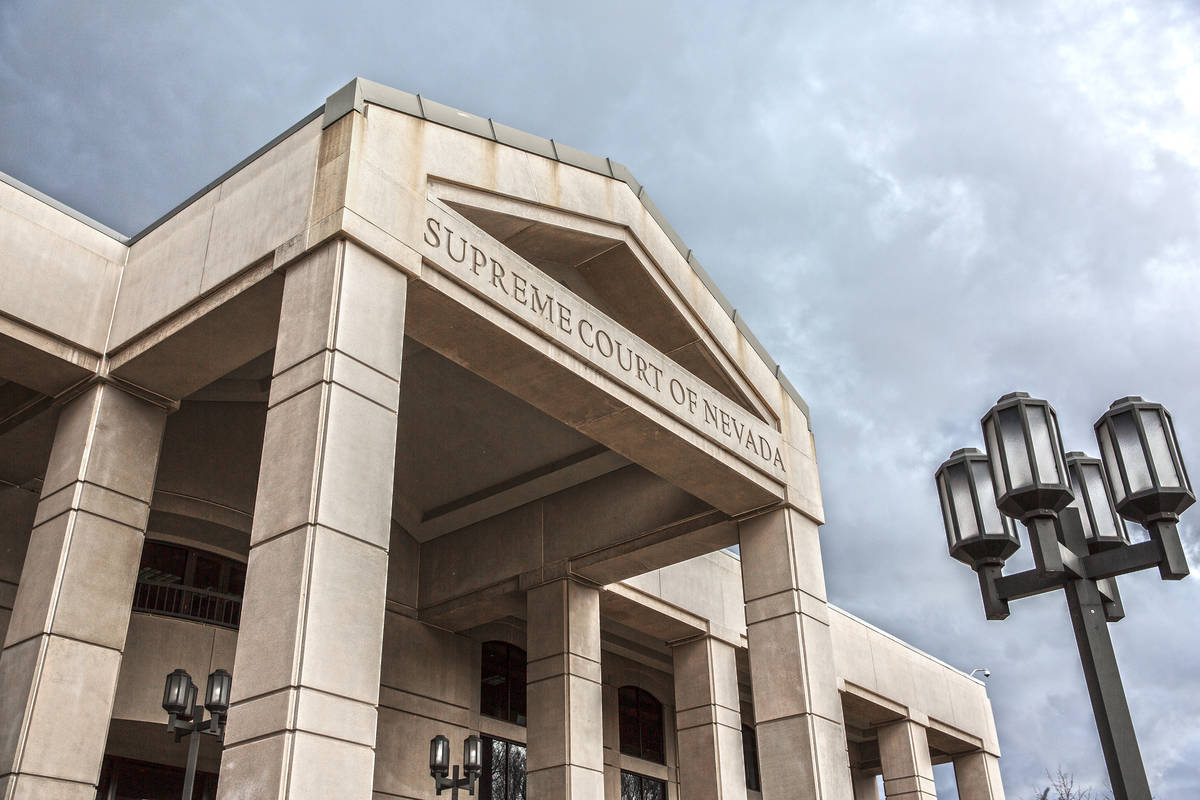Attorneys wrangle over tax supermajority, education scholarships

The Nevada Supreme Court heard oral arguments Monday in a case that pits the two-thirds supermajority tax requirement against a scholarship program that allows Nevada businesses to write off donations.
At issue is the amount of money available for the Educational Choice Scholarship Program, which provides money for privately-funded scholarships for K-12 education in private schools, with donations traded for state tax credits.
Parents including Flor Morency and the AAA Scholarship Foundation are suing the state, contending that a 2019 bill that froze the amount available for scholarships was unconstitutional, because it had the net effect of increasing revenue to the state but failed to get a required two-thirds vote. The plaintiffs are represented by attorneys from the Institute for Justice, a national libertarian public interest law firm.
The plaintiffs sued various state officials, the Department of Education, the Department of Taxation and the Legislature itself as defendants.
Capping scholarships
The Legislature approved the Educational Choice Scholarship program in 2015, in a Republican-led session heavy on school choice initiatives. Under the program, parents can apply for scholarships to cover private-school tuition, while businesses that donate money to the effort get a 100 percent tax credit from the state.
But in 2019, a Democratic Legislature passed Assembly Bill 458, which froze the amount of tax credits available to the program, thus limiting the amount of money Nevada would have to pay out in tax credits.
The plaintiffs contend that increases revenue available to the state, and since any bill that increases government revenue must get a two-thirds supermajority vote in both houses of the Legislature, they insist AB 458 is unconstitutional, as it fell one vote shy of a supermajority in the state Senate.
In May, however, Clark County District Judge Rob Bare found in favor of the state, ruling the supermajority provision didn’t apply to AB 458. The plaintiffs appealed the case to the Supreme Court.
More money, more problems
Morency’s attorney from the Institute for Justice, Joshua House, again argued that since the bill halts future increases to the pool of tax incentives available for scholarship donors, and the state will keep millions of dollars that would otherwise have been paid back through the tax breaks, the measure is unconstitutional.
“The bill sponsor repeatedly stated that (AB 458) was intended to increase tax revenues,” House said during the virtual hearing. “The bill was debated in the Revenue and Taxation committees, and (the Department of Taxation) labeled the bill a revenue item and projected it would increase revenues by millions of dollars in the current biennium and more in the future biennium.”
The program has continued to receive about $6.7 million annually in tax credits, a number that was supposed to increase to $7.3 million by the 2020 fiscal year. Because the scholarships must take into account future funding for the length of the child’s education, House said, fewer scholarships were awarded due to the likelihood of future increased tuition costs.
Chief Justice James Hardesty and Justice Elissa Cadish questioned House on just how far his interpretation of the supermajority provision went. Spending and appropriations, House responded, are at the discretion of the Legislature, but acquiring new revenue is not.
The state, represented by deputy solicitor general Craig Newby and Legislative Counsel Bureau attorney Kevin Powers, disagreed, arguing that freezing a tax credit does not increase the burden on individual taxpayers and is not subject to the two-thirds requirement.
Newby stressed the program is funded exactly as it was in previous fiscal years, with the same amount available on a first-come, first-served basis.
“And in fact, based on the 2019 Legislature’s actions in a separate bill, SB 551, there are more tax credits available for the opportunity scholarships and plaintiff parents to have their students apply for or plaintiff private scholarship organization to distribute as they see fit,” Newby said.
He further argued the state entities are not actually responsible for the plaintiffs’ lost scholarships, as the decisions to award those scholarships and solicit funding from donors are made by private scholarship companies. The state is therefore not legally responsible for any damages or lost money as sought by the parents.
Hardesty asked Newby if the payroll tax revenue for the state has remained the same; Newby said it had.
Powers was also quizzed by the justices, with Justice Kristina Pickering asking if the Legislature were to enact a 10 percent tax annually on all Nevadans for four years due to increased costs during the COVID-19 pandemic with a two-thirds majority vote, could it reconvene in two years and decide to extend that tax for more years with a simple majority vote?
Powers replied the Legislature could do that, because it would not be imposing a new burden on the taxpayer — only extending one that had already passed with the two-thirds majority.
Education choice debate
The case is part of a larger policy debate happening within the state and beyond on the idea of “school choice,” tax breaks or scholarships that allow students who would otherwise attend public school to enroll at a private school.
Republicans and Libertarians tend to favor the idea, both in Nevada and nationally, while Democrats oppose it on the grounds it will hurt enrollment, and therefore funding, for public schools.
The state Supreme Court ruled against a separate school choice measure in 2016, finding the funding method used in the establishment of the so-called Education Savings Accounts, which allow parents to use the tax money earmarked for their child’s public education toward private school tuition, unconstitutional.
Democrats later repealed that program from state law, however.
Contact Rory Appleton at rappleton@reviewjournal.com or 702-383-0276. Follow @RoryDoesPhonics on Twitter.